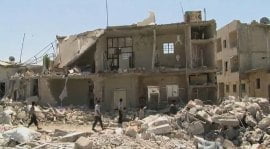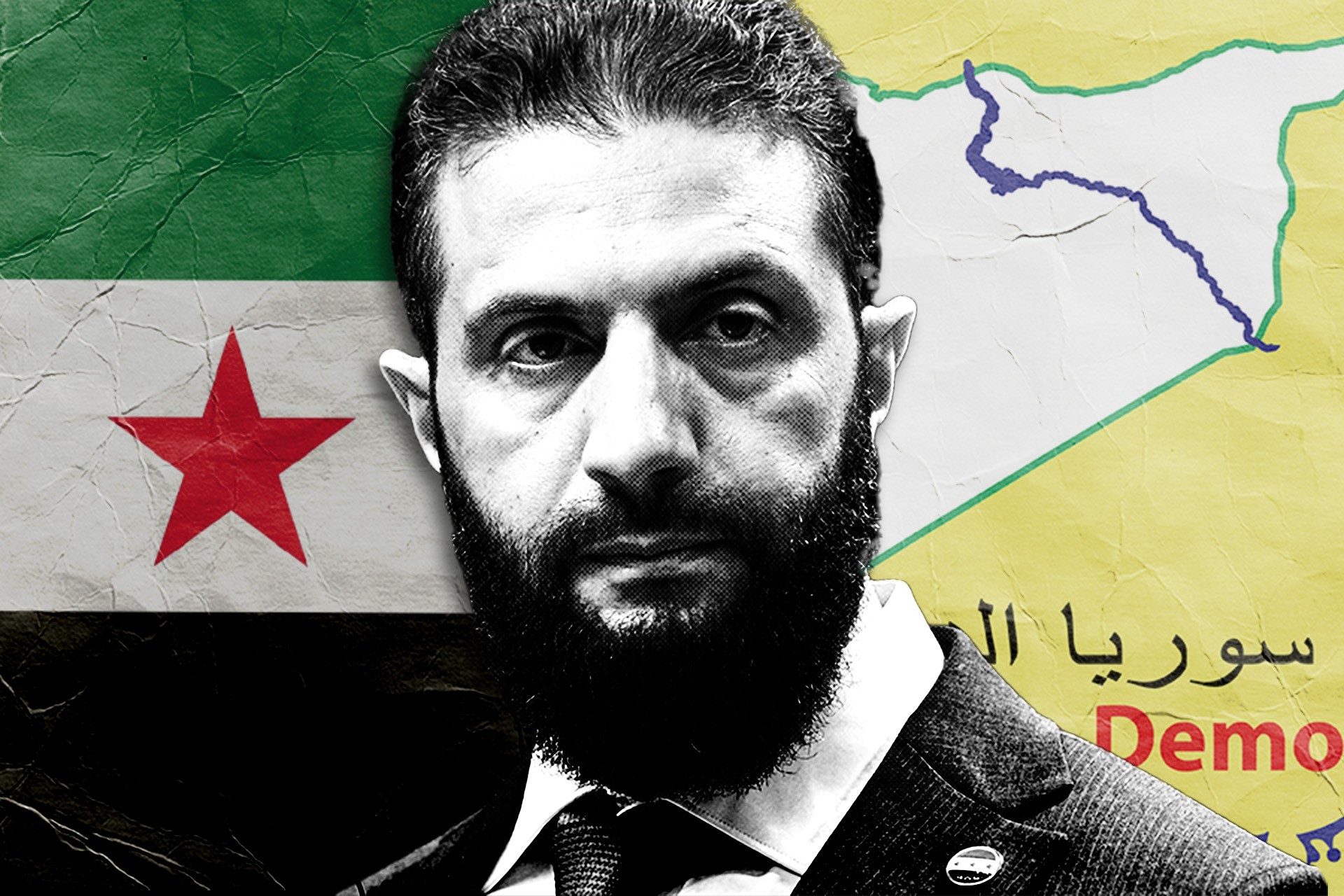This week, for the first time in ten years, Vladimir Putin attended the UN general assembly, followed by a closed door meeting with Barack Obama. Only one month ago such a meeting would have seemed highly unlikely. The significant increase of a Russian military presence in Syria over the past month has changed the situation.
On Monday, for the first time in ten years, Russian President Vladimir Putin attended the UN general assembly, after which he had a closed door meeting with US president Barack Obama. Only one month ago such a meeting would have seemed highly unlikely. Since the Ukrainian crisis relations between western governments and Russia have rapidly deteriorated as severe sanctions have been put on the country and Putin has become the most vilified man in Western media.
However, the significant increase of a Russian military presence in Syria over the past month has changed the situation. Seeing the gradual erosion and decomposition of Bashar Al-Assad’s state apparatus, Putin saw no other option than to move in, to prop up the weak Syrian regime in the face of rising Islamist currents.
The US was quick to denounce the move, but what this situation really brings to the surface is the weakness of US imperialism in the region. For more than a year the US and its coalition against the Islamic state have been bombing IS-controlled areas throughout Syria and Iraq, with little effect. Now they are forced to rely on the Russian intervention as the only way out of the crisis. It was revealing as to who calls the shots now that Barack Obama, speaking to the UN general assembly, had to shift his previous line dramatically in saying, “The United States is prepared to work with any nation—including Russia and Iran—to resolve the conflict”.
A question of coalition
In Iraq, the war on IS and the retaking of Iraqi towns has been painfully slow and cost thousands of lives. In the meantime IS has even managed to take new territories such as Ramadi, the capital of the Anbar governorate. This stems from the weakness of the Iraqi state, along with the inability of the US to directly coordinate operations with the troops who have played the most important roles in the offensives, namely Iranian-connected militias. At the same time the US’ partners from the Gulf states have been actively lobbying Iraqi Sunni tribes to withhold support for the anti-IS offensive as a bargaining chip with the central government.
In Syria, the efforts of the US has only met expanding IS forces, except for in the Kurdish areas where the leftist Kurdish YPG forces – a group which is designated as terrorists by the US – have inflicted several key blows to IS.
However, even the advances of the Kurds have stalled as they have been targeted by the Turkish regime of Erdoğan, one of the key members of the US led coalition. In fact the Erdoğan regime has started an aerial campaign aimed at Kurdish PKK militias in Iraq who have been the most effective forces against IS on the ground.
Meanwhile, Erdoğan has been actively supporting IS by allowing it to build a recruitment, transport and trafficking network in Turkey. In fact, it was Erdoğan’s energetic intervention which caused the US-supported YPG advances to stop short of taking the last major IS-controlled border crossing between Turkey and Syria. So while IS has been attacked by the US, one of their key allies have been busy resupplying it and keeping the flow of fighters into its territories open.
The Southern Front, which is the only remaining significant group formally to be a part of the Free Syrian Army, has not been able to unite into a formal army and its recent attempt to take the southern city of Daraa was halted by the CIA’s joint operations room in Jordan. Its areas and troops are gradually being absorbed by different Islamist currents who most likely keep it alive mainly as a source of receiving weapons from the West.
The attempts by the US to set up its own proxy force have also been sabotaged by its traditional allies. The highly publicized train and equip mission has been an utter humiliation of the whole US military establishment. Having spent hundreds of millions of dollars to build up a reliable force, the first team which entered Syrian soil was immediately attacked by the Turkish-supported Al-Qaeda group, Jabhat Al-Nusra. Of the fifty-odd fighters only a handful are accounted for today. It is believed that their positions were given to JaN by Turkish intelligence. The second team of US fighters, were sent in a few weeks ago, but their commander immediately defected to Jabhat Al-Nusra with loads of advanced military hardware, denouncing the US efforts to block the troops from fighting the Assad regime. Therefore, on Monday the whole effort was called off and the mission put on an open-ended standby.
All of these events reveals the deeply insoluble contradictions in which US finds itself. They have lost the trust of their traditional Turkish and Gulf state allies, who are now following their own narrow interests and are out of US control. Meanwhile Obama has no reliable troops on the ground. His cooperation with the YPG handicapped by the opposition of Erdoğan and the US cannot openly cooperate with the Iranians, Hezbollah or the Assad regime for fear of opposition from its allies and the Republicans in the US.
Russia enters Syria
The entrance of Russia onto the scene came as it was becoming increasingly clear that the Assad regime was buckling under the strains of the civil war. For Russia this would have been a blow because the Assad regime was Russia’s main ally in the Middle East and also home to the its only military facility outside of the former Soviet Union – the Tartus naval base.
The fall of Assad would not only lead to Syria being overrun by Islamist organisations, but also the destabilisation of Turkey, Lebanon and Jordan, as well as the Gulf States. This would be a major threat to Russian interests in the region and could have disastrous consequences for the whole of the world economy.
It would also have an immediate effect inside Russia, where Islamist groups have been gravitating towards IS in four of Russia’s Caucasus regions; Dagestan, Chechnya, Ingushetia and Kabardino-Balkaria.
By entering as a force into the Syrian civil war Russia not only gives a much-needed moral boost to the embattled and battle weary Syrian troops, but also much-needed technical, intelligence and aerial support which the US did not share with the regime. This will completely change the balance of forces on the battlefield.
At the same time Russia has set up a joint operations room with Iraq, Iran and Syria in Baghdad. This is a direct violation of the US-led coalition of which Iraq is a member.
In a press conference on Monday Hakem al-Zameli, the head of Iraq’s National Security and Defense Committee said that Iranian and Russian teams had already arrived in Iraq to start preparing for the four-party alliance.
He then went on to say, “Iraq needs to exchange experience and information intelligence with countries especially after it has become clear that the United State is not serious and has failed along with the International coalition to combat the Islamic State organization.”
In one respect Russia has managed to do what the US could not, which is to prepare a serious military campaign along with the forces who are actually fighting IS on the ground.
But there is a different reason for Putin’s intervention. Since 2014 following the Ukrainian crisis, Russia has been a pariah amongst other world powers, in particular the West which has imposed several tough sanctions leaving the country’s economy in a serious crisis. For Putin, the intervention in Syria is a way of reasserting himself on the world stage and at the same time reaching out to the West.
At the UN general assembly Putin called for an alliance along the lines of the one which defeated Hitler during the Second World War. Besides the implicit hint at the US support for Nazi and fascists in Ukraine, Putin was clearly hinting at the Soviet rout of Hitler’s army which led to a rapid surge in the popularity of the Soviets throughout the world and signaled their entrance onto the stage as a major world power.
No choice for Obama
For all his huffing and puffing, Obama and US imperialism have no choice but to accept Putin’s fait accompli, which is their only path for the stabilisation of Syria. One by one Western top officials have been lining up to concede that the West needs to cooperate with Russia. Indeed, what else do they want to do about it? They have been calling for an alliance of all nations against IS and now that Russia is offering this, they are in a weak position to refuse.
The previously adamant demand that the Assad regime has to go is also being watered down as top Western officials gradually admit that “there might be room for Assad” in a transitional regime.
It is clear that Assad, his family and his cronies are so tied to the Syrian state that it would collapse if they were removed. Even Obama, in spite of spending a long while denouncing the barbarism of the Syrian regime at the UN, had to admit that “realism dictates that compromise will be required to end the fighting and ultimately stamp out ISIL”.
Putin is offering Obama an olive branch, a way out of the mess that the US has caused in Syria, but he wants it on his terms and along with the recognition of Russia as a legitimate world power on equal terms. For Obama this presents an opportunity that he will not pass up, even though it will cause him trouble with the Republicans at home.
The European powers are also positive. The flow of refugees streaming out of Syria is already having a destabilising effect on the political system of the EU and causing divisions between the European ruling classes on the question of who is to bear the cost. At the same time the already-fragile EU economy, and in particular the German one, has been hit hard by the sanctions against Russia. Thus many top officials from EU countries have been signalling a change in their attitude and in particular in their demand for the overthrow of Assad.
The exception to the rule seems to be France’s Francois Hollande, who has opened a case against Assad for crimes against humanity. However, in his speech at the UN general assembly he revealed his isolation by appealing to the European nations not to let the refugee crisis determine their stance on Syria. Of course that is easy to say when France is less exposed to the refugee crisis and the sanctions on Russia and has closer ties to the Gulf states and other funders of Islamic fundamentalism in the Middle East.
Far from changing the situation in the Middle East qualitatively the Russian move has brought reality in line with the underlying facts: that the Assad regime and Iran are the only forces which can fight IS in Syria and Iraq, as opposed to the traditional allies of the West who are the main sources of instability. But being unable to take the decision themselves, the Americans had it taken for them by Russia and have no choice but to follow suit.
Not only do they have to accept the facts on the ground, but the US must also stop funding the forces on the ground if they want to avoid a direct confrontation with Russia. Of course they would have done this sooner or later anyway, because it has not worked, but the fact that Russia is forcing their hand is an extra humiliation.
Imperialist tit for tat
The root of all the barbarism in Syria are to be traced to the interventions of US imperialism and its rotten allies in Turkey and the Gulf states. Firstly through the destabilisation of Iraq and its division along sectarian lines by the US occupation which left millions dead and many more displaced. And secondly through the imperialist interventions in Syria since the beginning of the Syrian revolution in 2011.
Since then these powers have spent billions of dollars in building up the Islamist opposition to oust Assad and weaken Syria. The CIA alone has spent almost $1bn per year in what has become one of the biggest missions in the history of the agency. While the monster they have created has now become a liability for the US, its allies are too invested to give up. But as Putin told Obama, you can’t have it both ways.
Of course, while Putin can expose the hypocrisy of the West, it does not mean that he has the best of Syria at heart. For Putin, Syria in itself does not mean anything. In fact the Tartus naval base was not an important position for Russia compared with other problems that Russia might have. For Putin, Syria is a bargaining chip which he can use to regain Russia’s position as a world power and as a regional power in the Middle East.
Russia’s involvement might weaken the Islamists, but it will not lead to the creation of a free, democratic people’s Syria. First of all, they are staunchly defending the Assad regime, which is and has always been a dictatorship. Assad might seem to be the main fighter against Islamism today, but he had no problems with Syrian Islamists, including Al-Qaeda, as long as he could use them to put pressure on the US occupation in Iraq. He also had no problem seeing them hijack the Syrian revolution. While the revolutionary movement had sympathy amongst many Syrians in Assad-controlled areas, the Islamist movement today has strengthened Assad’s support. As long as the question was one of crushing the revolution, the imperialists, the Islamists and Assad were de facto in the same camp.
Even today, the proposals of the Iranians and the Russians (as well as that of Assad) have simply amounted to a power-sharing deal involving all the groups in Syria. But who are these groups? They are rotten criminal gangs who operate under the FSA umbrella, Western-backed neo-liberal democrats, Western-backed militias and different shades of Turkish and Saudi-backed Islamists. With the exception of the Kurdish forces, none of the groups in Syria represent the Syrian masses, and, rest assured, all of the groups will turn on the Kurds before the ink has dried on any future deal.
The forces of the Syrian revolution have long been killed, subdued or otherwise crushed by the imperialist vultures of the region. Their mistake, for which they have to pay heavily, was to try to keep the struggle within the confines of capitalism and to call for the assistance of US imperialism. Of course class struggle will not cease, but for now any salvation for the Syrian masses will have to come from revolutionary movements elsewhere in the region.
Within capitalism however, there are no solutions to the crisis of the Middle East. While Russia might fight Islamic fundamentalism in Syria, it will do so in defence of class society and of capitalist exploitation.
The only forces who have the interests of the masses at heart are the masses themselves. On a capitalist basis none of the problems of the masses will be solved. Only through a regional revolutionary struggle against capitalism, can the barbarism of sectarianism, poverty and misery be discarded from the region.






